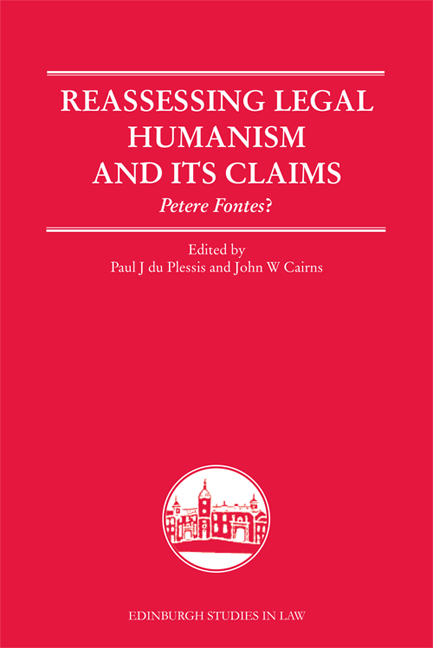Book contents
- Frontmatter
- Contents
- Preface
- A Note on Names and Book Titles
- List of Contributors
- List of Abbreviations
- Introduction
- Part I DEFINING LEGAL HUMANISM
- Part II A BREAK WITH THE PAST/CONTEMPORARY CRITIQUES
- Part III LEGAL HUMANISM: A PAN-EUROPEAN METHODOLOGY?
- 6 Elegant Scholastic Humanism? Arias Piñel's (1515–1563) Critical Revision of Laesio Enormis
- 7 The Working Methods of Hugo Grotius: Which Sources Did He Use and How Did He Use Them in His Early Writings on Natural Law Theory?
- 8 Joannes Leunclavius (1541–1594), Civilian and Byzantinist?
- 9 Brissonius in Context: De formulis et solennibus populi Romani verbis
- 10 A Lawyer and His Sources: Nicolas Bohier and Legal Practice in Sixteenth-Century France
- 11 Humanism and Law in Elizabethan England: The Annotations of Gabriel Harvey
- Part IV LEGAL HUMANISM AND THE BOOK TRADE
- Postscript
- Index
11 - Humanism and Law in Elizabethan England: The Annotations of Gabriel Harvey
from Part III - LEGAL HUMANISM: A PAN-EUROPEAN METHODOLOGY?
Published online by Cambridge University Press: 05 September 2016
- Frontmatter
- Contents
- Preface
- A Note on Names and Book Titles
- List of Contributors
- List of Abbreviations
- Introduction
- Part I DEFINING LEGAL HUMANISM
- Part II A BREAK WITH THE PAST/CONTEMPORARY CRITIQUES
- Part III LEGAL HUMANISM: A PAN-EUROPEAN METHODOLOGY?
- 6 Elegant Scholastic Humanism? Arias Piñel's (1515–1563) Critical Revision of Laesio Enormis
- 7 The Working Methods of Hugo Grotius: Which Sources Did He Use and How Did He Use Them in His Early Writings on Natural Law Theory?
- 8 Joannes Leunclavius (1541–1594), Civilian and Byzantinist?
- 9 Brissonius in Context: De formulis et solennibus populi Romani verbis
- 10 A Lawyer and His Sources: Nicolas Bohier and Legal Practice in Sixteenth-Century France
- 11 Humanism and Law in Elizabethan England: The Annotations of Gabriel Harvey
- Part IV LEGAL HUMANISM AND THE BOOK TRADE
- Postscript
- Index
Summary
A paper on English legal humanism may be, almost by definition, a paper without a subject. If legal humanism is taken in its continental sense described by Douglas Osler, as a concern with the establishment of the true texts of the Justinianic corpus and elsewhere, and their interpretation as such, using philological and historical methods, as part of the study of Antiquity, then we would hardly expect there to be very much in England, certainly not in connection with English law. Even if we take a broader approach to humanism, things are not much better. Anyone who takes the trouble to do a Google search on the phrase “English legal humanism” will, at the time this is being written, get hardly a single hit. While none of us would want to treat Google as a definitive index of the world's knowledge, the paucity of references does indicate that it is something of a non-topic. According to one work on humanism in Tudor England, the study of law, like the study of logic, Latin grammar and Aristotelianism, was transformed by the activity of humanist scholars; but the references are to France and Basel, not to England. So far as the modern literature goes, there is nothing there.
It may be that it is not really possible to go much further than John Baker, dealing with the early part of the sixteenth century in his volume in the Oxford History of the Laws of England. Wisely distancing himself from the use of the term “humanism” in favour of a broader idea of Renaissance learning, he makes six points. First, English lawyers did take a historical approach to law, insofar as English lawyers always had to look to the past to identify the law of their own day; and in the sixteenth century they began to print some of the earliest books of the law, dating back to the twelfth and thirteenth centuries. But there is no suggestion that these texts were being edited with a view to the production of an accurate scholarly text, as opposed to simply taking a single corrupt manuscript and printing it. There is nothing to rival the attempts to restore the texts of the civil law.
- Type
- Chapter
- Information
- Reassessing Legal Humanism and its ClaimsPetere Fontes?, pp. 282 - 296Publisher: Edinburgh University PressPrint publication year: 2015



